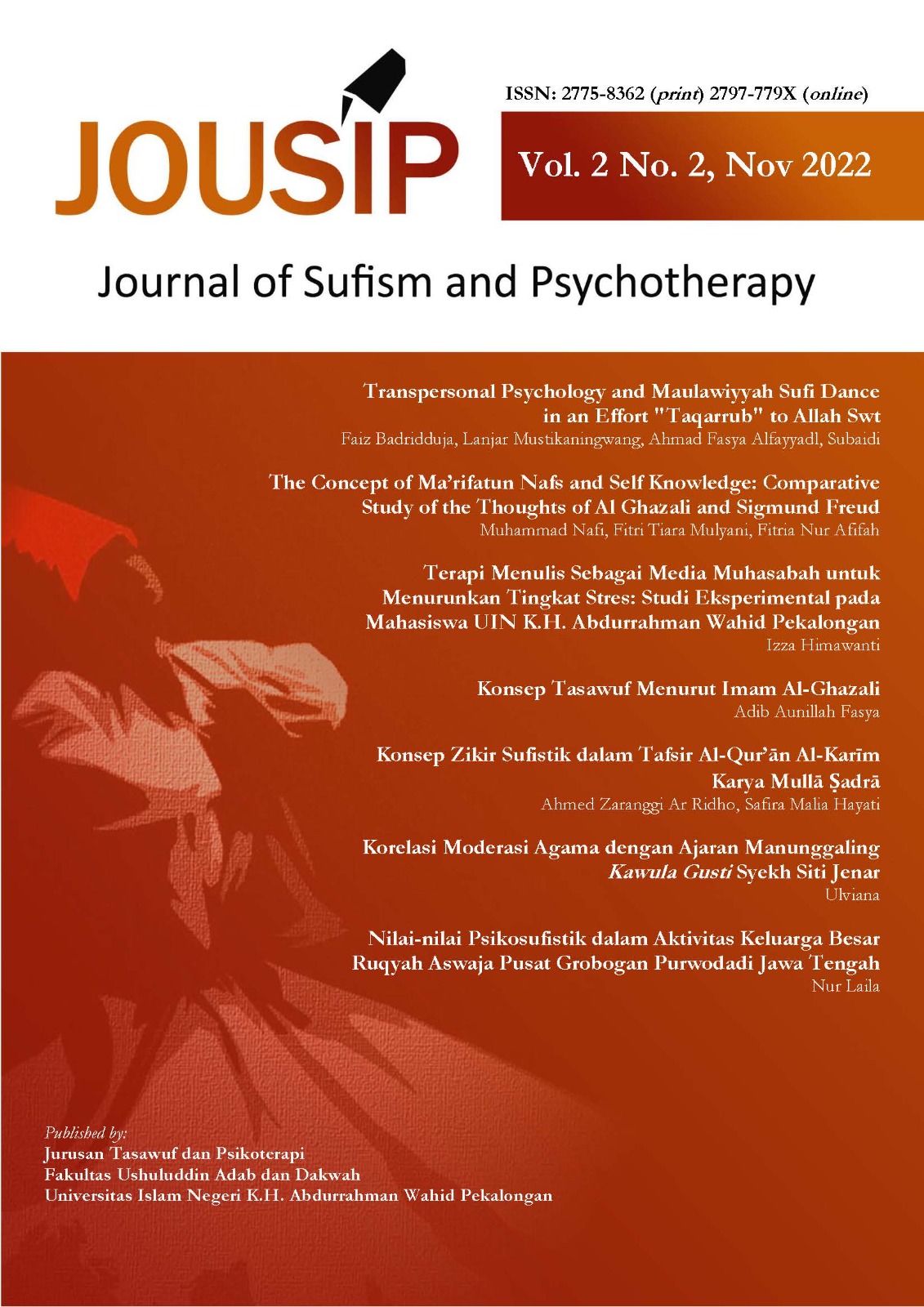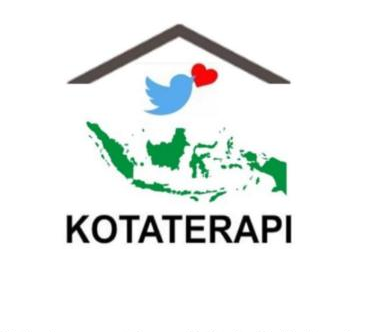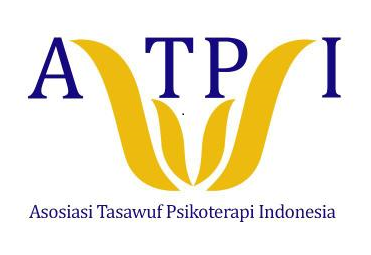The Concept of Ma’rifatun Nafs and Self Knowledge
Comparative Study of the Thoughts of Al Ghazali and Sigmund Freud
DOI:
https://doi.org/10.28918/jousip.v2i2.6728Keywords:
Ma`rifatun Nafs, Self-Knowledge, Al Ghazali, Sigmund FreudAbstract
Self-knowledge is a successful understanding of important things about oneself which helps in efforts to build a good and positive attitude towards oneself, to accept and develop oneself. The main attention is directed to the introduction of personality, recognition of self-potential and being able to map oneself regarding one's own strengths and weaknesses. The understanding of self-knowledge can be found in many perspectives, this time it will be discussed according to Al Ghazali's view from an Islamic point of view, and from a psychological perspective, namely Sigmund Freud, both of whom have something in common with their thoughts. The purpose of this research is to know the concept of ma'rifatun nafs and self-knowledge according to Al-Ghazali and Sigmund Freud, both of whom are figures of psychology from Eastern and Western cultures who have different characteristics. This type of research is library research with primary and secondary data collection methods and documentation. Data analysis used qualitative analysis. The results of the study stated that ma'rifatun nafs according to Al Ghazali includes three human characteristics, namely shifatul baha'im, shifatusy syayathin, and shifatul malaikah. Meanwhile, according to Sigmund Freud, self-knowledge by understanding one's psychological processes includes the conscious, preconscious, and unconscious levels. Ways to know yourself include self-introspection, knowing your outer self, knowing your inner self, always remembering the purpose of creation, monitoring yourself and asking for the opinions of others.
References
Afrida, A. (2018). Hakikat Manusia dalam Perspektif Al-Quran. Al-Qisthu: Jurnal Kajian Ilmu-ilmu Hukum Islam, 16(2), 54-59.
Al-Ghazali, I. (2003). Ihya Ulum al-Din, edisi pertama, Terj. Purwanto, dari judul asli: Imam al Ghazali’s Ihya ‘Ulum-id-din (The Book of Religious Learning). Bandung: Marja.
Al-Ghazali, I. (1984). Mutiara Ihya Ulumuddin, (disusun oleh Rus’an). Semarang: Wicaksana.
Bahreis, H. (1981). Ajaran-ajaran Akhlak Al-Ghazali. Surabaya: Al-Ikhlas.
Farmawati, C., & Hidayati, N. (2019). Penyusunan dan pengembangan alat ukur islamic personality scale (IPS). JPIB: Jurnal Psikologi Islam dan Budaya, 2 (1), 19–30.
Fauzi, A., Suhartini, A., & Ahmad, N. (2020). PENDIDIKAN SEBAGAI UPAYA PENGEMBANGAN KESADARAN DIRI (AL-MA’RIFATUN NAFS). At-Tajdid: Jurnal Pendidikan dan Pemikiran Islam, 4(01), 21-37.
Feist, G. (2017). Teori Kepribadian. Jakarta: Salemba Humanika.
Freud, S. (2002). Kenangan Masa Kecil Leonardo da Vinci, Terj. Yuli Minarno, dari judul Leonardo Da Vinci and A Memory of His Childhood, Cet. I. Yogyakarta: Penerbit Jendela.
Freud, S. (1984). Memperkenalkan Psikoanalisa, Terj. K. Bertens, dari: Ueber Psychoanalyse, Funf Vorlesungen. Jakarta: PT. Gramedia.
Ghozali, M., & Dewi, C. K. (2021). Konstruksi Kebahagiaan dalam Pandangan al-Ghazālī: Antara Misykāh, Kīmyā’dan Mi ‘yār. JOUSIP: Journal of Sufism and Psychotherapy, 1(2), 191-206.
Glasse, C. (1996). Ensiklopedi Islam, Terj. Ghufron A. Mas’adi, The concise Encyclopaedya of Islam Cet. 1. Jakarta: PT Raja Grafindo Persada.
Gymnastiar, A. (2002). Meraih Bening Hati Dengan Manajemen Qolbu. Jakarta: Gema Insani Press.
Hanafi, A. (1991). Pengantar Filsafat Islam. Jakarta: PT. Bulan Bintang.
Helmy, M. I. (2018). Kepribadian dalam Perspektif Sigmund Freud dan Al-Qur’an: Studi Komparatif. Nun: Jurnal Studi Alquran Dan Tafsir Di Nusantara, 4(2), 105-120.
Mahmud. (2011). Metode Penelitian Pendidikan. Bandung: Pustaka Setia.
Meinarno, E. A., & Sarwono, S. W. (2009). Psikologi sosial. Jakarta: Salemba Humanika.
Othman, A. I. (1981). Manusia Menurut Al-Ghazali, Terj. Anas Mahyuddin. Bandung: Pustaka.
Sharip, H., Ma’on, S. N., Abdullah, M. Z., & Farmawati, C. (2022). Integration of Islamic Personality in Radiation Protection Practice among Muslim Radiographers. Environment-Behaviour Proceedings Journal, 7(20), 73-78.
Subhi, M. R. (2020). Bimbingan Pengembangan Pribadi Rendah Hati Berlandaskan Tasawuf Ulama Mutaakhirin (Unpublished dessertation) Universitas Pendidikan Indonesia, Bandung, Indonesia.
Suriansah, D. (2021). Menuju Kesempurnaan Jiwa: Tasawuf Pergerakan Sa’id Hawa Membangun Peradaban Manusia. Penerbit A-Empat.
Wicaksono, P. (2020). Manfaat dan Cara Mengenali Diri Sendiri. Diakses di https://www.qubisa.com/article/manfaat-dan-cara-mengenal-diri-sendiri tanggal 29 Juli 2022.
Zuhara, E. (2018). Konsep jiwa dalam tradisi keilmuan Islam. JURNAL EDUKASI: Jurnal Bimbingan Konseling, 4(1), 44-66.
Downloads
Published
Issue
Section
License
Copyright (c) 2022 Muhammad Nafi, Fitri Tiara Mulyani, Fitria Nur Afifah

This work is licensed under a Creative Commons Attribution-ShareAlike 4.0 International License.

















